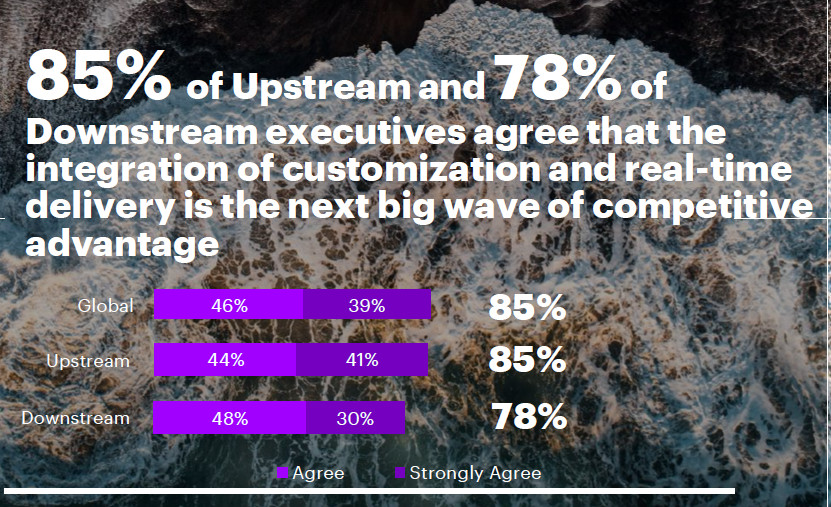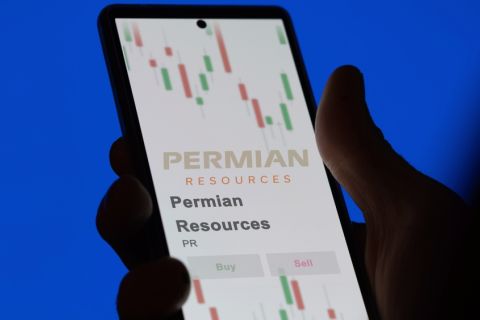A wave of digital transformation has swept the oil and gas industry. Most oil majors have invested billions of dollars in data-driven digital technologies to unlock trapped treasures. According to Accenture’s Technology Vision 2019 survey, the energy industry is moving toward a post-digital era, which means the digital transformation that once gave companies a competitive edge is becoming a norm.
“Companies need to do much more than executing the commonplace digital capabilities in order to meet the ever-increasing expectations of the current and next generation of users,” said Rich Holsman, digital lead for Accenture’s Resources Operating Group. “Digital foundational capabilities, such as cloud applications, customer analytics [and] mobile applications that are context specific, are now commonplace, and consumers and workers are expecting a new level of convenience and intimacy from every company they interact with.”
Although the post-digital era will be challenging, it will provide tremendous opportunities to companies for maximizing digital technologies to enhance their operations. The Technology Vision survey has summarized five trends that will help companies succeed in the next phase of innovation.
The power of DARQ
According to the study, 97% of upstream executives and 91% of downstream executives report that the pace of innovation has accelerated over the past three years due to emerging technologies. The study further envisions that distributed ledger technology, artificial intelligence (AI), extended reality and quantum computing—which Accenture abbreviates as DARQ—will be the pillars of the next wave of innovation. This fact is supported by the finding that nearly 85% of executives in the energy industry are experimenting with one or more DARQ technologies. Also, the majority of the industry’s players believe that these technologies will be “transformational” for their organizations over the next three years. Both upstream and downstream officials voted AI as the top DARQ technology to impact energy organizations.

Digital demographics
According to the survey, technology-driven interactions are creating an expanding technology identity for every consumer. This knowledge will be key to not only understanding the next generation of consumers but also to delivering rich, individualized, experience-based relationships in the post-digital age. The survey reveals that half of oil and gas industry executives believe digital demographics give their organization a new way to identify market opportunities for unmet customer needs.
Tech-driven workforce
More than two-thirds of the respondents agreed that their employees are more “digitally mature” than their organization. Workers who are empowered by their skills and knowledge in addition to a new set of tech-driven capabilities are “waiting” for companies to catchup.
“This doesn’t mean that [employees are] already capable, for instance, to interpret the analytics provided for preventive maintenance or ready to work with digital twins. What it does mean is that employees are keen to see clear actions from the company to move forward with more up-to-date technologies and interfaces in their day to day work as employers often underestimate how digitally mature their employees are,” Holsman explained.
He pointed out that the upstream sector is applying digital technologies in routine tasks and the digital maturity of the workforce is allowing them to better embrace the potential of new digital models and technologies. “We are seeing more AI, edge computing and automation being used in the field and more automation on the rigs and platforms as companies seek to de-man assets, increase automation and collect more data for analysis,” Holsman said.
To retain these tach-savvy workers, or “human+” workforce as the study calls it, energy companies must adapt advanced strategies to support new ways of working in the post-digital age.
Secure ecosystem
Digital-driven businesses that operate in an interconnected ecosystem increase exposure to risks not only to companies but to the entire ecosystem. “As organizations are becoming increasingly interconnected, ecosystems are driving significant business value, but with that value comes risk,” Holsman said.
Companies experience many high-profile cyber breaches every day, and they have realized that the weakest link in any system will be found and exploited by attackers. “As businesses become more digitally mature, they need to foster a culture of security within their own organization and within their own people,” Holsman said.
The survey reported that 91% of upstream executives and 85% of downstream executives agree that to be truly resilient, organizations must rethink their approach to security in a way that defends themselves
and their entire network system.
“Oil and gas companies are experiencing cyber threats because they work with a large variety of ecosystem providers such as their joint venture partners, specialty solution providers and software-as-a-service solutions providers,” Holsman said. “In this new interconnected model, oil companies need to develop and manage security best practices across the entire oil and gas ecosystem.”
Lightning speed connections
As digitalization spreads and scales through the oil value chain, big tech firms and digital startups are targeting the oil and gas sector through automation, cloud applications and AI.
In the post-digital era, every moment will be a market opportunity, the study reported. According to Holsman, downstream companies can utilize these opportunities to provide personalized services using data and AI. The study reported that 85% of upstream and 78% of downstream executives agree that the integration of customization and real-time delivery is the next big wave of competitive advantage.

For instance, Shell offers customers the option to pay one cent extra per liter of fuel and invests that money in projects to reduce carbon emissions. Shell also revealed a new fuel delivery service that allows customers to “order” fuel using a mobile app and get the fuel delivered to them.
“Tomorrow’s energy industry leaders are already investing in the digital ecosystems of the future and the next wave of emerging technologies. This should give them a good start in the post-digital era—an age with massive customer, employee and societal expectations,” the study reported.
Recommended Reading
Matador Stock Offering to Pay for New Permian A&D—Analyst
2024-03-26 - Matador Resources is offering more than 5 million shares of stock for proceeds of $347 million to pay for newly disclosed transactions in Texas and New Mexico.
TPG Adds Lebovitz as Head of Infrastructure for Climate Investing Platform
2024-02-07 - TPG Rise Climate was launched in 2021 to make investments across asset classes in climate solutions globally.
Stockholder Groups to Sell 48.5MM of Permian Resources’ Stock
2024-03-06 - A number of private equity firms will sell about 48.5 million shares of Permian Resources Corp.’s Class A common stock valued at about $764 million.
Northern Oil and Gas Ups Dividend 18%, Updates Hedging
2024-02-09 - Northern Oil and Gas, which recently closed acquisitions in the Utica Shale and Delaware Basin, announced a $0.40 per share dividend.
Buffett: ‘No Interest’ in Occidental Takeover, Praises 'Hallelujah!' Shale
2024-02-27 - Berkshire Hathaway’s Warren Buffett added that the U.S. electric power situation is “ominous.”





